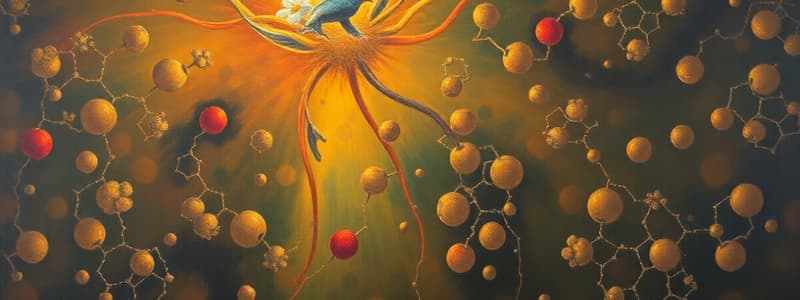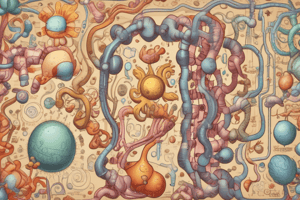Podcast
Questions and Answers
What is the correct way to denote a fatty acid with 16 carbons and one double bond located on the 9th carbon?
What is the correct way to denote a fatty acid with 16 carbons and one double bond located on the 9th carbon?
- 16:1D9 (correct)
- C16:1D9
- 16:1D9C
- C16:1D8
Which configuration of unsaturated fatty acids contributes to kinks in the fatty acid tail?
Which configuration of unsaturated fatty acids contributes to kinks in the fatty acid tail?
- Trans configuration
- Saturated configuration
- Omega-3 configuration
- Cis configuration (correct)
How do melting points of fatty acids generally change with chain length?
How do melting points of fatty acids generally change with chain length?
- They increase with longer chains (correct)
- They remain constant regardless of chain length
- They fluctuate unpredictably
- They decrease with longer chains
Which classification of lipids focuses on their role in biological systems?
Which classification of lipids focuses on their role in biological systems?
What is true about the classification of lipids?
What is true about the classification of lipids?
What effect do cis double bonds have on the physical properties of fatty acids?
What effect do cis double bonds have on the physical properties of fatty acids?
Which of the following is an example of how lipids can be classified by their structure?
Which of the following is an example of how lipids can be classified by their structure?
What is the significance of counting double bonds in fatty acids during nomenclature?
What is the significance of counting double bonds in fatty acids during nomenclature?
What is the primary function of triglycerides?
What is the primary function of triglycerides?
Which of the following statements about phosphoglycerides is true?
Which of the following statements about phosphoglycerides is true?
What distinguishes galactolipids from phospholipids?
What distinguishes galactolipids from phospholipids?
How do sphingolipids differ from other types of lipids mentioned?
How do sphingolipids differ from other types of lipids mentioned?
Which characteristic of triglycerides contributes to their function in buoyancy?
Which characteristic of triglycerides contributes to their function in buoyancy?
Why are storage lipids, like triglycerides, considered neutral?
Why are storage lipids, like triglycerides, considered neutral?
What type of reaction is involved in the formation of triglycerides?
What type of reaction is involved in the formation of triglycerides?
What is a common feature of glycerolipids?
What is a common feature of glycerolipids?
What characteristic defines lipids?
What characteristic defines lipids?
What is one of the main roles of lipids in biological systems?
What is one of the main roles of lipids in biological systems?
Which statement about fatty acids is correct?
Which statement about fatty acids is correct?
Which type of lipid is derived from sterols?
Which type of lipid is derived from sterols?
What property distinguishes amphipathic lipids from hydrophobic lipids?
What property distinguishes amphipathic lipids from hydrophobic lipids?
How are unsaturated fatty acids geometrically characterized?
How are unsaturated fatty acids geometrically characterized?
What is true about the carbon atoms in typical fatty acid chains?
What is true about the carbon atoms in typical fatty acid chains?
What aspect of fatty acids causes kinks in their chains?
What aspect of fatty acids causes kinks in their chains?
Flashcards are hidden until you start studying
Study Notes
Lipids
- Lipids are a broad class of molecules that are insoluble in water (e.g. waxes, oils, fats).
- They are either hydrophobic, fully water hating/insoluble in water, or amphipathic, with both water soluble and water insoluble groups on one molecule.
- Lipids play a significant role in energy storage, biomembranes, signaling, and enzymatic co-factors.
Fatty Acids
- They contain a hydrophilic "head" and a hydrophobic "tail".
- Usually contain 12 to 24 carbons, an even number only.
- They can be subdivided into saturated, monounsaturated and polyunsaturated.
- Unsaturated fatty acids can have two configurations based on the cis/trans arrangement of the double bonds.
- Cis double bonds cause kinks in the chain, due to restricted rotation around the double bonds.
Fatty Acid Nomenclature
- Standard: The nomenclature includes the chain length, number of double bonds, and the position of the first double bond. Example: 16:1Δ9 cis, 16:1Δ9 hexadecenoic acid (palmitoleic acid).
- Omega: The omega system numbers the carbon atoms starting from the terminal CH3 group.
Melting Points
- Melting points are influenced by the chain length and the presence of double bonds.
- Longer chains have higher melting points.
- Cis double bonds reduce the melting point due to the kinks in the tail, leading to a less compact structure.
Lipid Classification
- Lipids can be classified by synthetic pathway, function, structure, and chemical composition.
- Different criteria can lead to overlapping categories.
Glycerolipids
- Composed of glycerol and fatty acids.
- Glycerol is a 3-carbon polyalcohol.
- Triglycerides are a class of glycerolipids, used for energy storage, buoyancy, and thermal insulation.
Phosphoglycerides
- Glycerol, fatty acids, phosphate group, and a polar head group.
- Important component of biomembranes.
Galactolipids
- They contain galactose linked to glycerol by a glycosidic bond, with linoleic acid as the main fatty acid.
- They are NOT phospholipids.
Sphingolipids
- Based on sphingosine.
- Can be phospholipids, simple or complex.
Difference between storage and membrane lipids
- Storage lipids are neutral to store energy efficiently.
- Membrane lipids are polar to form biomembranes and interact with the aqueous environment.
Studying That Suits You
Use AI to generate personalized quizzes and flashcards to suit your learning preferences.




